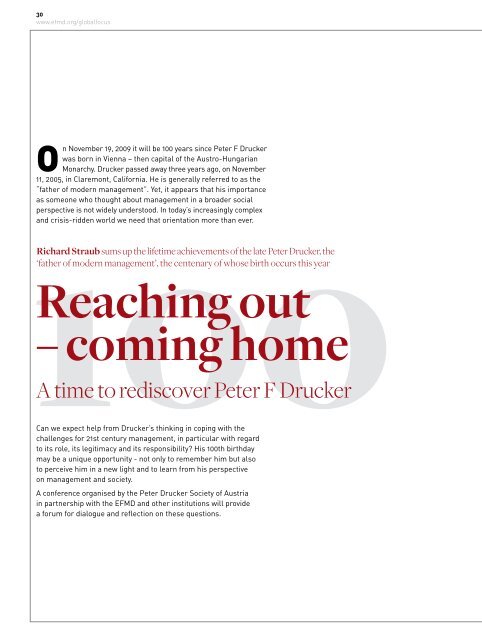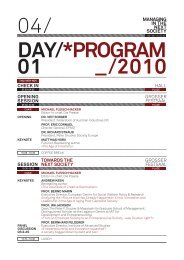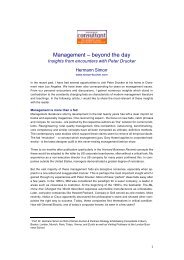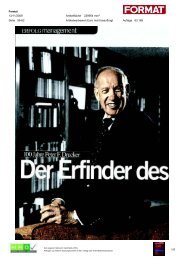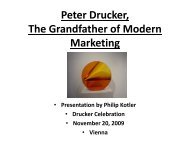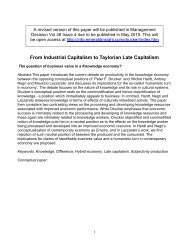Download PDF-Version (469 k) - Peter Drucker Society of Austria
Download PDF-Version (469 k) - Peter Drucker Society of Austria
Download PDF-Version (469 k) - Peter Drucker Society of Austria
You also want an ePaper? Increase the reach of your titles
YUMPU automatically turns print PDFs into web optimized ePapers that Google loves.
30<br />
www.efmd.org/globalfocus<br />
On November 19, 2009 it will be 100 years since <strong>Peter</strong> F <strong>Drucker</strong><br />
was born in Vienna – then capital <strong>of</strong> the Austro-Hungarian<br />
Monarchy. <strong>Drucker</strong> passed away three years ago, on November<br />
11, 2005, in Claremont, California. He is generally referred to as the<br />
“father <strong>of</strong> modern management”. Yet, it appears that his importance<br />
as someone who thought about management in a broader social<br />
perspective is not widely understood. In today’s increasingly complex<br />
and crisis-ridden world we need that orientation more than ever.<br />
Richard Straub sums up the lifetime achievements <strong>of</strong> the late <strong>Peter</strong> <strong>Drucker</strong>, the<br />
‘father <strong>of</strong> modern management’, the centenary <strong>of</strong> whose birth occurs this year<br />
Reaching out<br />
– coming home<br />
A time to rediscover <strong>Peter</strong> F <strong>Drucker</strong><br />
Can we expect help from <strong>Drucker</strong>’s thinking in coping with the<br />
challenges for 21st century management, in particular with regard<br />
to its role, its legitimacy and its responsibility? His 100th birthday<br />
may be a unique opportunity - not only to remember him but also<br />
to perceive him in a new light and to learn from his perspective<br />
on management and society.<br />
A conference organised by the <strong>Peter</strong> <strong>Drucker</strong> <strong>Society</strong> <strong>of</strong> <strong>Austria</strong><br />
in partnership with the EFMD and other institutions will provide<br />
a forum for dialogue and reflection on these questions.
IMAGE COURTESY: DRUCKER INSTITUTE, CLAREMONT GRADUATE UNIVERSITY<br />
31<br />
Reaching out – coming home: A time to rediscover <strong>Peter</strong> F <strong>Drucker</strong> by Richard Straub EFMD Global Focus | Volume 03 | Issue 01 2009
32<br />
www.efmd.org/globalfocus<br />
Beyond the fashion <strong>of</strong> the day<br />
There is no doubt that <strong>Drucker</strong> had a defining<br />
influence on the managerial mind in the 20th<br />
century. He called himself a writer and authored<br />
more than three dozen books and countless<br />
articles and essays.<br />
He elevated management from mere incidental<br />
practice to a “discipline”. Yet, he does not fit into<br />
the mould <strong>of</strong> mainstream management gurus,<br />
academics or consultants. He was unique in<br />
his “unscientific” approach and in his holistic<br />
perspective. Also his longevity – not only in<br />
the physical sense – seems to be unique. In 1997<br />
Forbes magazine featured <strong>Drucker</strong> on the cover<br />
under the headline “Still the Youngest Mind” –<br />
he was then 88 years old.<br />
Most <strong>of</strong> <strong>Drucker</strong>’s books still appear to be<br />
relevant and “young” today – even those<br />
written some 50 years ago. This puts him in<br />
marked contrast to many <strong>of</strong> the management<br />
bestsellers <strong>of</strong> recent decades.<br />
Take management classics like The Practice <strong>of</strong><br />
Management (1954) or The Effective Executive<br />
(1966): you will still find them on the “active”<br />
bookshelf <strong>of</strong> many executives. Newt Gingrich,<br />
while serving as Republican Speaker <strong>of</strong> the House<br />
in America, even made The Effective Executive<br />
required reading for every newly sworn-in<br />
representative –a practice that should be<br />
considered for the European Parliament and<br />
the European Union member states assemblies.<br />
However, there are <strong>Drucker</strong> titles that have not<br />
made it into the managerial mind on a broad<br />
basis, even though they were laying the wider<br />
foundations for his management thinking. Yet<br />
these books may contain the key to what makes<br />
him so different.<br />
Take early works such as The End <strong>of</strong> Economic<br />
Man (1939) or The Future <strong>of</strong> Industrial Man (1942)<br />
with their deep analysis <strong>of</strong> modern industrial<br />
society outlining the path towards a “functioning<br />
society”, which he further elaborated in later<br />
books such as The Post-Capitalist <strong>Society</strong> (1991).<br />
These books were highly regarded and influential<br />
at the time they were published. <strong>Drucker</strong>’s analysis<br />
in The End <strong>of</strong> Economic Man, denouncing the<br />
failure <strong>of</strong> capitalism and socialism to create the<br />
foundation for a functioning society, was reviewed<br />
by Winston Churchill, who praised the book<br />
and its author in the Times Literary Supplement<br />
and made it a required reading for his <strong>of</strong>ficers.<br />
Seeing the future before it is seen by others<br />
<strong>Drucker</strong> also stands out in his ability to identify<br />
emerging trends and developments. Far from<br />
being a futurist, he could actually grasp the future.<br />
“I never predict,” he told a journalist at Forbes.<br />
“I just look out the window and see what’s visible<br />
- but not yet seen.” Thus he was a master in<br />
deciphering and interpreting emerging patterns.<br />
He took a wider and deeper perspective on major<br />
social trends. One <strong>of</strong> the most striking examples<br />
<strong>of</strong> his ability to identify major shifts in the<br />
economy and society way ahead <strong>of</strong> others: it<br />
was as early as 1957 in Landmarks <strong>of</strong> Tomorrow<br />
that he pointed out the increasing importance<br />
<strong>of</strong> knowledge work, knowledge capital and<br />
knowledge jobs.<br />
He elaborated more deeply on the characteristics<br />
<strong>of</strong> the new breed <strong>of</strong> knowledge workers in The<br />
Age <strong>of</strong> Discontinuity in 1968. Later in his life he<br />
launched a challenge to 21st century management<br />
to increase the productivity <strong>of</strong> knowledge work<br />
– to create a similar surge in productivity as had<br />
been achieved for manual work in the 20th century.<br />
Management as a role in society<br />
In <strong>Drucker</strong>’s perspective management does not<br />
appear as a limited subject for its own sake but<br />
related to a bigger cause. He described the 20th<br />
century society as a society <strong>of</strong> institutions and<br />
organisations.<br />
Organisations took over virtually all key roles in<br />
society and <strong>of</strong>ten stretched far beyond the borders<br />
<strong>of</strong> the territory <strong>of</strong> the state and the influence<br />
<strong>of</strong> governments. They became increasingly<br />
powerful and influential – be it corporations,<br />
government institutions or important nonpr<strong>of</strong>it<br />
organisations. Hence they had become<br />
the key building blocks <strong>of</strong> modern societies.<br />
From this perspective he inferred the vital<br />
importance <strong>of</strong> management. Management<br />
is the organ and the tool for high-performing<br />
and self-governed institutions in every sector.<br />
Consequently effective management and<br />
pr<strong>of</strong>essional managers became a central<br />
concern and focus for <strong>Drucker</strong> in his lifelong<br />
IMAGE COURTESY: DRUCKER INSTITUTE, CLAREMONT GRADUATE UNIVERSITY<br />
‘I never predict,’ <strong>Drucker</strong><br />
told a journalist at<br />
Forbes. ‘I just look out the<br />
window and see what’s<br />
visible – but not yet seen’
33<br />
Reaching out – coming home: A time to rediscover <strong>Peter</strong> F <strong>Drucker</strong> by Richard Straub EFMD Global Focus | Volume 03 | Issue 01 2009<br />
Management is the organ<br />
and the tool for highperforming<br />
and selfgoverned<br />
institutions<br />
in every sector<br />
inquiry – including questions relating to<br />
effectiveness, legitimacy, managerial power,<br />
responsibility and accountability.<br />
He never had the slightest doubt that “management<br />
is most and foremost about human beings and that<br />
one <strong>of</strong> the key task <strong>of</strong> the manager was to make people<br />
capable <strong>of</strong> joint performance, to make their strength<br />
effective and their weakness irrelevant” (from The<br />
Essential <strong>Drucker</strong>).<br />
<strong>Drucker</strong> had hoped that management would<br />
live up to its responsibility. His experience with<br />
corporate behemoths like General Motors, IBM,<br />
GE and others in the 1940s and 1950s confirmed<br />
him in his conviction that management can contribute<br />
to the common good by running a business in a<br />
pr<strong>of</strong>essional way.<br />
Alfred Sloan, then Chairman <strong>of</strong> GM, became<br />
<strong>Drucker</strong>’s hero <strong>of</strong> a corporate leader with a deep<br />
sense <strong>of</strong> responsibility not only for his role as a<br />
business man, but also as a human leader who<br />
cared for the well-being and livelihood <strong>of</strong> the<br />
workers entrusted to the corporation.<br />
This is why <strong>Drucker</strong> put all his energy into making<br />
management a better instrument to help executives<br />
fulfil this responsibility. This meant to move<br />
management from a mere incidental practice towards<br />
a well defined, systematic and organised “discipline”.<br />
But the development <strong>of</strong> modern management is also<br />
the story <strong>of</strong> <strong>Drucker</strong>’s own rising disenchantment<br />
with capitalism, which in the late 20th century<br />
seemed to reward greed as easily as it did performance.<br />
He was sickened by the excessive riches awarded<br />
to mediocre executives even as they slashed the<br />
ranks <strong>of</strong> ordinary workers. Today we can relate<br />
all too well to a statement he made in an interview<br />
given in the late 1980s. “In the next economic<br />
downturn there will be an outbreak <strong>of</strong> bitterness<br />
and contempt for the super-corporate chieftains<br />
who pay themselves millions.”<br />
The doubt and disillusionment with business that<br />
<strong>Drucker</strong> expressed in his later years caused him to<br />
turn away from the corporation and instead <strong>of</strong>fer<br />
his advice to the non-pr<strong>of</strong>it sector.<br />
European influences<br />
<strong>Drucker</strong> is widely perceived as an American<br />
management thinker. It is true that he spent most<br />
<strong>of</strong> his adult life in America. However, the European
34<br />
www.efmd.org/globalfocus<br />
IMAGE COURTESY: DRUCKER INSTITUTE, CLAREMONT GRADUATE UNIVERSITY<br />
roots and influences must not be ignored. He<br />
grew up in Vienna and at the age <strong>of</strong> 18 he moved to<br />
Germany to work in Hamburg and then Frankfurt.<br />
At Frankfurt University he enrolled in law studies<br />
and got his doctorate with a dissertation on the<br />
historical and philosophical foundation <strong>of</strong><br />
international law. Upon the rise to power <strong>of</strong> the<br />
Nazis he left Germany for Britain, where he had<br />
the opportunity to attend the famous seminars<br />
<strong>of</strong> John Maynard Keynes. In 1937 he emigrated<br />
to America with his German-born wife Doris,<br />
whom he had married just days before.<br />
His way <strong>of</strong> inquiry and his holistic and<br />
multidisciplinary perspective are rooted in his<br />
formative years in Europe. His home in suburban<br />
Vienna, until 1918 the capital <strong>of</strong> a multinational<br />
and multicultural empire <strong>of</strong> some 50 million<br />
people, was indeed an intellectual power house<br />
at the time.<br />
Before the catastrophes and cataclysms <strong>of</strong> the<br />
first world war, the Depression and the rise <strong>of</strong><br />
the Nazis, Vienna was a cosmopolitan melting<br />
pot with an incredible level <strong>of</strong> cultural and<br />
intellectual density and diversity – some <strong>of</strong><br />
the world’s leading minds in the fields <strong>of</strong><br />
economics, philosophy, architecture, fine arts,<br />
medicine, literature, mathematics, law and<br />
other disciplines made Vienna a unique venue.<br />
Public cafes and private salons were the places<br />
where dialogue and discourse between the<br />
disciplines was thriving.<br />
The <strong>Drucker</strong> home was one <strong>of</strong> the important<br />
intellectual meeting places in Vienna, where the<br />
young <strong>Drucker</strong> had the opportunity to experience<br />
such eminent personalities as Joseph Schumpeter,<br />
Ludwig von Mises, Othmar Spann, Sigmund<br />
Freud, Thomas Mann and Friedrich von Hayek.<br />
His early years in Vienna and his time in Hamburg,<br />
Frankfurt, Berlin and London provided <strong>Drucker</strong><br />
with a solid intellectual foundation. His thinking<br />
was grounded in a coherent world view that<br />
encompassed all dimensions <strong>of</strong> human existence<br />
including the religious and spiritual ones. Hence<br />
he was always hostile to a reductionist perspective,<br />
making humans mere cogs in a money-making<br />
machine.<br />
His personal experience in the 1920s and 1930s<br />
with the catastrophic failures <strong>of</strong> business and<br />
economic management and politics, which<br />
ultimately prepared the ground for the rise <strong>of</strong><br />
the Nazis, deeply influenced him and strengthened<br />
his conviction that good management is not only<br />
essential for the individual company to succeed<br />
but for its contribution to the economic and<br />
political stability <strong>of</strong> the wider community.<br />
Reaching Out – Coming Home,<br />
the Centenary Event in Vienna<br />
<strong>Peter</strong> <strong>Drucker</strong> had impact on all advanced<br />
industrial economies in the 20th century. In<br />
the 1950s he had a pr<strong>of</strong>ound influence on how<br />
American corporations organised and operated:<br />
decentralisation, federal organisations and<br />
management by objectives had become the<br />
dominant mantra in corporate America, based<br />
on <strong>Drucker</strong>’s analysis <strong>of</strong> General Motors in The<br />
Concept <strong>of</strong> the Corporation (1946).<br />
He was venerated in Japan as in no other place<br />
as a prophet and an uncontested authority. With<br />
more than one million copies sold, The Practice<br />
<strong>of</strong> Management exemplified how avidly the<br />
Japanese managers took up his thinking and<br />
how deeply he marked their minds with a view<br />
<strong>of</strong> the corporation as a human community.<br />
In Europe, the picture is somewhat spotty. There<br />
are strong and visible European followers such<br />
Charles Handy, Fredmund Malik, <strong>Peter</strong> Lorange,<br />
<strong>Peter</strong> <strong>Drucker</strong> had impact<br />
on all advanced industrial<br />
economies in the 20th century<br />
Guido Stein, <strong>Peter</strong> Gomez and Hermann Simon<br />
who have built on <strong>Drucker</strong>’s thinking to make<br />
their own mark on modern management in<br />
the sense <strong>of</strong> a specific European model. <strong>Peter</strong><br />
Paschek co-authored a book with <strong>Drucker</strong> in<br />
2004. Yet, <strong>Drucker</strong> may not have entered into<br />
the collective management mind in Europe as<br />
he did in America and in Japan.<br />
This is why it is a perfect moment to take <strong>Peter</strong><br />
<strong>Drucker</strong> back to his original “home” and to launch<br />
a broad European dialogue on the foundations<br />
<strong>of</strong> management in view <strong>of</strong> the current and future<br />
challenges. Vienna, as his place <strong>of</strong> birth and<br />
<strong>of</strong> his upbringing, will take pride in hosting a<br />
unprecedented event for one <strong>of</strong> its greatest sons<br />
and to attracting the highest-calibre management<br />
experts from all over the world. It will be a unique<br />
event in many ways. There is no period when<br />
a pr<strong>of</strong>ound reflection on management and its<br />
impact would be more appropriate.<br />
Joseph Schumpeter, yet another giant <strong>of</strong> <strong>Austria</strong>n<br />
origin and friend <strong>of</strong> the <strong>Drucker</strong> family with a<br />
significant influence on <strong>Drucker</strong>’s own thinking,<br />
taught him that it may be more important to ask<br />
the right questions than to pretend to have all<br />
the answers. <strong>Peter</strong> <strong>Drucker</strong> has given us both<br />
– huge questions for the 21st century and the<br />
reasoning to find the right answers.<br />
ABOUT THE AUTHOR<br />
Richard Straub is Director <strong>of</strong> Development, EFMD,<br />
and President <strong>of</strong> the <strong>Peter</strong> <strong>Drucker</strong> <strong>Society</strong> <strong>of</strong> <strong>Austria</strong>
Projekt3 24.11.2008 19:46 Uhr Seite 1<br />
35<br />
EFMD Global Focus | Volume 03 | Issue 01 2009


